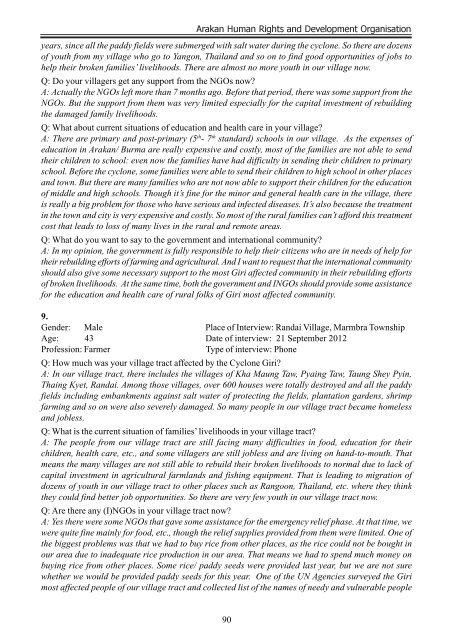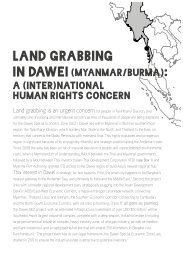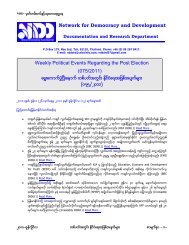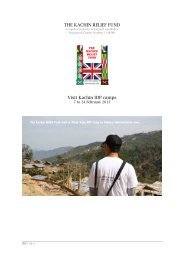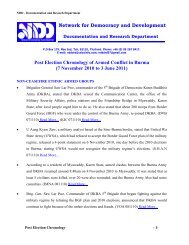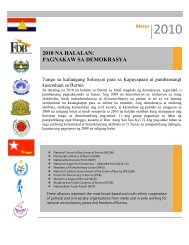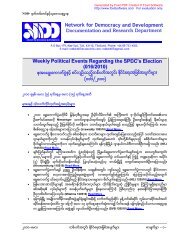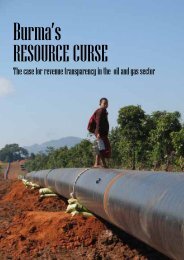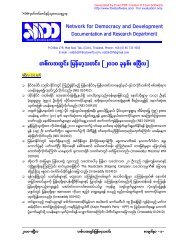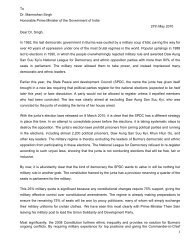Cyclone Giri - Two Years On - Burma Action Ireland
Cyclone Giri - Two Years On - Burma Action Ireland
Cyclone Giri - Two Years On - Burma Action Ireland
Create successful ePaper yourself
Turn your PDF publications into a flip-book with our unique Google optimized e-Paper software.
Arakan Human Rights and Development Organisation<br />
years, since all the paddy fields were submerged with salt water during the cyclone. So there are dozens<br />
of youth from my village who go to Yangon, Thailand and so on to find good opportunities of jobs to<br />
help their broken families’ livelihoods. There are almost no more youth in our village now.<br />
Q: Do your villagers get any support from the NGOs now<br />
A: Actually the NGOs left more than 7 months ago. Before that period, there was some support from the<br />
NGOs. But the support from them was very limited especially for the capital investment of rebuilding<br />
the damaged family livelihoods.<br />
Q: What about current situations of education and health care in your village<br />
A: There are primary and post-primary (5 th - 7 th standard) schools in our village. As the expenses of<br />
education in Arakan/ <strong>Burma</strong> are really expensive and costly, most of the families are not able to send<br />
their children to school: even now the families have had difficulty in sending their children to primary<br />
school. Before the cyclone, some families were able to send their children to high school in other places<br />
and town. But there are many families who are not now able to support their children for the education<br />
of middle and high schools. Though it’s fine for the minor and general health care in the village, there<br />
is really a big problem for those who have serious and infected diseases. It’s also because the treatment<br />
in the town and city is very expensive and costly. So most of the rural families can’t afford this treatment<br />
cost that leads to loss of many lives in the rural and remote areas.<br />
Q: What do you want to say to the government and international community<br />
A: In my opinion, the government is fully responsible to help their citizens who are in needs of help for<br />
their rebuilding efforts of farming and agricultural. And I want to request that the international community<br />
should also give some necessary support to the most <strong>Giri</strong> affected community in their rebuilding efforts<br />
of broken livelihoods. At the same time, both the government and INGOs should provide some assistance<br />
for the education and health care of rural folks of <strong>Giri</strong> most affected community.<br />
9.<br />
Gender: Male Place of Interview: Randai Village, Marmbra Township<br />
Age: 43 Date of interview: 21 September 2012<br />
Profession: Farmer<br />
Type of interview: Phone<br />
Q: How much was your village tract affected by the <strong>Cyclone</strong> <strong>Giri</strong><br />
A: In our village tract, there includes the villages of Kha Maung Taw, Pyaing Taw, Taung Shey Pyin,<br />
Thaing Kyet, Randai. Among those villages, over 600 houses were totally destroyed and all the paddy<br />
fields including embankments against salt water of protecting the fields, plantation gardens, shrimp<br />
farming and so on were also severely damaged. So many people in our village tract became homeless<br />
and jobless.<br />
Q: What is the current situation of families’ livelihoods in your village tract<br />
A: The people from our village tract are still facing many difficulties in food, education for their<br />
children, health care, etc., and some villagers are still jobless and are living on hand-to-mouth. That<br />
means the many villages are not still able to rebuild their broken livelihoods to normal due to lack of<br />
capital investment in agricultural farmlands and fishing equipment. That is leading to migration of<br />
dozens of youth in our village tract to other places such as Rangoon, Thailand, etc. where they think<br />
they could find better job opportunities. So there are very few youth in our village tract now.<br />
Q: Are there any (I)NGOs in your village tract now<br />
A: Yes there were some NGOs that gave some assistance for the emergency relief phase. At that time, we<br />
were quite fine mainly for food, etc., though the relief supplies provided from them were limited. <strong>On</strong>e of<br />
the biggest problems was that we had to buy rice from other places, as the rice could not be bought in<br />
our area due to inadequate rice production in our area. That means we had to spend much money on<br />
buying rice from other places. Some rice/ paddy seeds were provided last year, but we are not sure<br />
whether we would be provided paddy seeds for this year. <strong>On</strong>e of the UN Agencies surveyed the <strong>Giri</strong><br />
most affected people of our village tract and collected list of the names of needy and vulnerable people<br />
90


